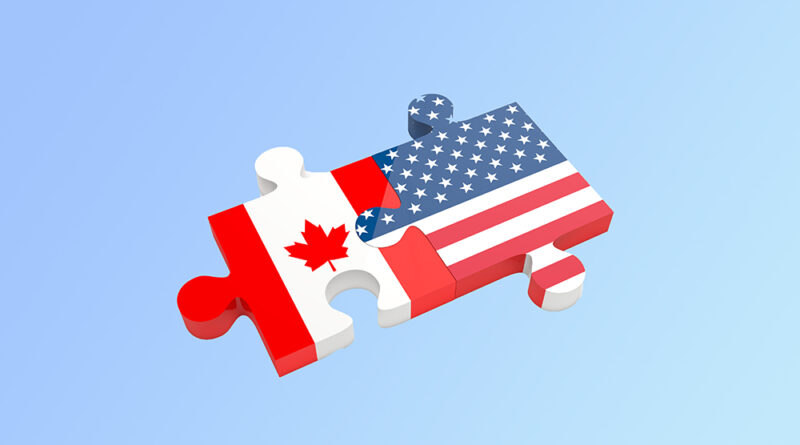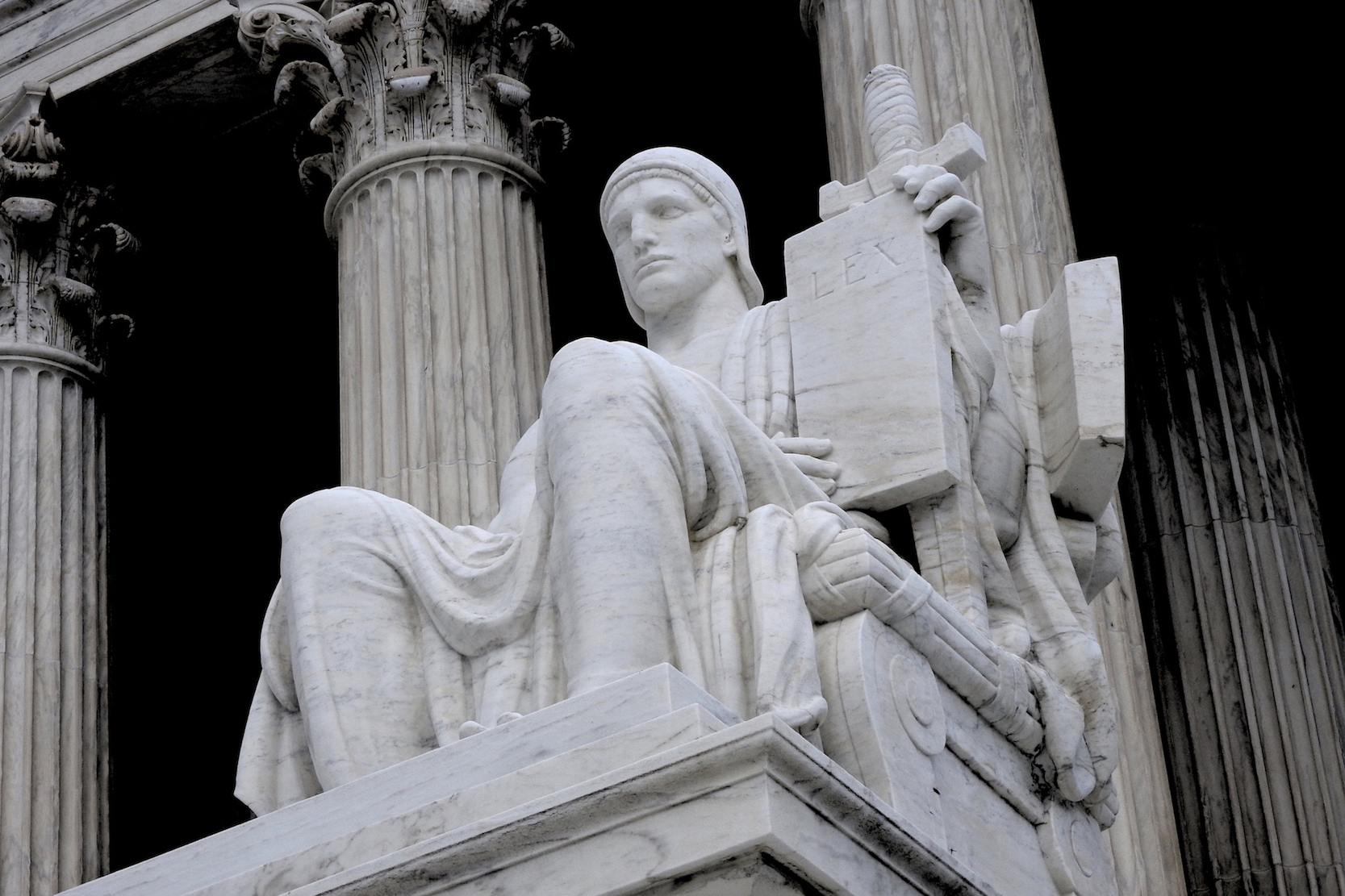The 51st state? One Canadian journalist shares a different way Canada and the United States Could Merge
Since President Donald Trump referred to Canada as the United States’s “51st state,” SD METRO Associate Editor Doug Page spoke with Canadian journalist and writer Diane Francis to learn more about the view from up north. She dissects why President Trump is seeking 25% tariffs on Canadian goods, that country’s politics, and how the United States is perceived north of the 49th parallel. Canada and the United States share the world’s largest, undefended border, about 5,500 miles long. Is Canada about to become the 51st state? There’s a significant reason Republicans might oppose the idea.
Diane is the author of many books, including Merger of the Century: Why Canada and America Should Become One Country, a prophetic examination about a tie-up between both countries published 12 years ago. She writes for the Financial Post in Toronto and has a very successful Substack column.
Diane started life in the Chicago area and brings an insight rarely heard – an understanding of both U.S. and Canadian cultures and their shared but different worldviews.
SD METRO: Justin Trudeau is leaving the Premiership of Canada. What should Americans think of him? How does he rate in terms of being a Prime Minister of Canada.
Diane Francis: Trudeau is a nepo baby. His father had been prime minister.
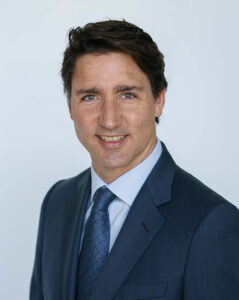
He’s a good-looking guy. His mother was beautiful. So he was essentially elected without any credentials. He was a celebrity kid, and he never had a job that we know of. He ran for office briefly before becoming leader and then Prime Minister. We don’t know if he has any degrees. There’s a big, dark piece of his biography that we knew very little about. So I always like to jokingly say he got elected because of his daddy’s name and his mommy’s looks. And he’s not very astute.
For 10 years, he’s governed as Prime Minister, even though he only got 30% of the popular vote in all the elections because he made a coalition with a Socialist party and has taken the government in a woke, ultra left-wing direction, and not enhanced the country. He reduced its living standard. The per capita income has gone down in 10 years under his rule. He has hurt natural resource extraction, which is the basis of our wealth. He’s hurt our economy. He’s opened the floodgates to questionable immigration. The numbers are horrific and there was no screening, and now we have a crime problem. And our reputation has fallen internationally.
Our military has been completely neglected to the point of really not almost existing. And so, all of these things were things that I warned we shouldn’t be doing when I wrote this book. And I said the merger of the century was going to happen because Canadians aren’t doing it and they better do it. And if they don’t do it, they will have to merge. They will be forced to merge with the United States. So we’re at this point now.
SD METRO: So, you really think you’re at a point here where for Canada to survive as some kind of political entity, it needs to merge with the United States?
Diane Francis: Well, we already are partnered. Economically and sociologically. Canadians and Americans live in each other’s countries. They intermarry. They send their children to each other’s schools. It’s all very jolly and friendly, and we have a free trade deal or we did. So that facilitated economic growth on both sides of the border.
Now we are facing a situation where our neglect of our military has really gotten under Trump’s skin, and I think it should. We’ve been freeloading. And also, his failure to have decent security and policies in the country and controls over immigration has resulted in drug smuggling and illegal migrants from Canada going into the U.S.
SD METRO: When you think about the United States and Canada, it would seem that nobody would ever think that a country would ignore its own borders, certainly the northern border, too, as well, the Arctic. But that keeps coming up.
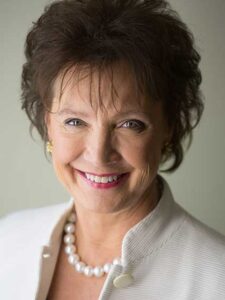
Diane Francis: It’s a national security issue. Canada’s done absolutely nothing about it. It hasn’t developed it. There’s oil up there. They decided not to use it because they had a green government. There are about 300 soldiers up there. The area is bigger than Western Europe. And of course, the Chinese are sniffing around, and the Russians are sniffing around, and this is upsetting. The same applies maybe to Greenland.
It’s a crisis in Canada because Trump is threatening us with 25% tariffs, which would plunge us into a deep recession and create financial problems for everybody. What’s gotten us here is this neglect of our security, immigration, perimeters, borders, military. And Trump got very upset because there were illegal migrants and fentanyl coming in from Canada.
And so, he just blew a gasket and said, “We’re going to slap tariffs on you just like Mexico because you guys aren’t doing your jobs.” And he wasn’t wrong.
SD METRO: I came across a Canadian Broadcasting story from May of last year. It said 126,000 Canadians left Canada alone for the United States in 2022. The great motivation to leave, based on this story, was Justin Trudeau, crime, and the cost of housing. What is going on with the cost of housing in Canada?
Diane Francis: We’ve had a deluge of migrants mostly coming in as foreign students.
The government didn’t check whether the schools they said they were coming here to attend existed or not. So this gigantic scam was perpetrated on the people of Canada because of an inept government run by Trudeau and his immigration system.
We have something in the order of 3 million unaccounted for young men who allegedly are here to go to school, and they don’t. They go to Vancouver and Toronto.
We have enormous housing prices in both those cities. Our crime rates in both those cities are through the roof. They hijack cars because they don’t have employment. They never get deported.
They live in gangs, and it’s a real problem. There’s gun violence. They get guns from the U.S., and I think they’re doing some shenanigans down there. Many live along the border. So this is a policing problem that Canada created and isn’t doing enough about. And the other problem that it’s created is not only these excessive housing prices, bringing millions of people in without having a place for them to live, is that they all get free health cards. So our healthcare systems are overwhelmed. It takes six months to get a doctor’s appointment now.
It’s a nightmare created by Mr. Trudeau.
SD METRO: Given that he’s announced he’s going to leave office sometime in March, who is likely to succeed him? Who do you think it’ll be?
Diane Francis: One of the members of his clown car will take over party leadership and then they have to call an election. Look, it’s worse than that. He just quit.
Who does that? We have a crisis. We have a president of the United States who’s threatening to plunge us into a deep recession who’s furious at us because of our incompetence, who tells us that we didn’t do enough at the border and there’s border problems, and he quits on us. He just resigns. And then, he says there will have to be a convention of his party to elect a leader. And so, we’re not even going to have an election until six months from now. You do not leave a country adrift in the middle of a crisis. Even if you created it yourself, you appoint somebody else who knows what they’re doing.
But you don’t just up and leave, and that’s what he’s done. So it just shows you the measure of the man. He’s immature and he’s without any morality as a leader.
SD METRO: Is there nobody sitting in the Prime Minister’s office? Is there nobody there today? He’s gone off somewhere else. He’s hung out the vacant sign.
Diane Francis: It’s hard for Americans to understand. It’s the parliamentary system. So, it works that the party that won the most seats in the Parliament, their leader becomes the Prime Minister. There’s no succession. There’s no vice president.
SD METRO: Right.
Diane Francis: There’s no next in line succession. So when he leaves, only he can call an election. And so, he’s not calling an election to give his party time to find somebody. He also suspended the business of Parliament. It’s called prorogate. He’s frozen the Parliament. It’s like telling Congress they can’t do anything for six months. It is beyond belief. And because he is the only one that can declare an election, there isn’t going to be one until the new leader, and then he or she’s going to take their time. Now legally there’s a limit, and that’s October.
We’re going to be plunged into a very serious economic and other kinds of crises being leaderless for months with a very important negotiation with Trump.
SD METRO: Does this then mean if you have a Parliament that’s not working or has been closed up for the time being, that really the governing falls to the various governors of the provinces and territories in Canada? For lack of a better option, do they become the ones in charge?
Diane Francis: Well, they’re becoming outspoken, and they’re going down to Mar-a-Lago. The premiers are very powerful and they’re all very competent. But as the system exists, he has shut down legislation that would’ve kicked him out of office had it been allowed to be open, but he didn’t want to be kicked out. So he’s resigned. He’s not doing a lick of work. His party is futzing around trying to find a leader, none of whom will be any more competent. And then, they will decide when to call an election. And that won’t be earlier than June.
You do not just leave. That’s like a captain letting his ship go adrift. That’s what he’s done. It’s really unprecedented. And it’s the measure of the man, the spoiled brat who became a prime minister.
SD METRO: Back in the early 1990s, you wrote a book called A Matter of Survival: Canon of the 21st Century. I’ve not read the book, but can you tell us a little bit more about it. Was it part of your evolution toward writing the book Merger of the Century?
Diane Francis: A Matter of Survival was more about the general global geopolitical threats that faced Canada and everybody. That was the Russia stuff. The India stuff. The Middle Eastern stuff, so that was a little bit more international. Merger of the Century came about because of being American and Canadian. I saw these two countries and understand their cultures. They are different. They’re not hugely different, but they’re different.
And of course, their systems of government and the type of leaders they have are different. And I just knew it wasn’t fair for Canadians to free load off American military protection. And so, also it was not a good idea to be as dependent as we were becoming economically and trade-wise with the Americans if you wanted to be a freestanding country.
SD METRO: Sure.
Diane Francis: And so, I just said, “You don’t want to do those things? Talk about a full impression merger.” I think what would work best is a European Union type economic union. Because the politics are too different.
SD METRO: Right.
Diane Francis: The Europeans have found a way to keep their cultures, keep their political systems, but do business nicely with one another. And of course, they’re also wrestling with the problem of security. They don’t have sufficient security. They’ve also relied on the United States too much for it.
SD METRO: When you think about turning Canada into the 51st state, putting aside how palatable that idea is, it seems Canada leans more to the left than the United States, making it likely hard to find enough Republican senators to sign off on turning Canada into the 51st state.
Diane Francis: If the two were merged (politically), there’d never be a Republican president again. That would be 40 million (additional) Democrats. But one of the things I wanted to also mention was that in my book Merger of the Century, with an investment banker, I sat down and said, “Okay, what would this look like if they were two corporations, one big, one little, how does that work? Who gets compensated? How are they paid off?” And I did this model and it’s absolutely fascinating. So what we did was we added up the natural resource wealth in each country. I’m talking forests, freshwater, arable land, metals and minerals, oil. Canada is $17 trillion richer than the United States. So to call us a 51st state is beyond insulting. It’s actually very stupid.
Canada is richer than the United States in natural assets and resources. It’s also geographically bigger. It’s bigger than the 50 states. So to talk about a 51st state is rooted either in stupidity, but whether it’s stupid or not, it’s very insulting and it’s very inappropriate. This is a hugely wealthy country.
SD METRO: Understood. And it was interesting that you go through the five ways that Canada and the United States could merge. You talk certainly about the mineral wealth. But it’s also interesting that U.S. GDP comes in at about $27 trillion and Canadian GDP comes in at about $2.1 trillion, which you mentioned as one of the reasons to merge, because it gives a combined entity a serious leg up on those who seem to be opposed to both of our countries, Russia and China. Compare that to China’s $18 trillion in Russia’s $2 trillion in their GDP. The economic union between Canada and the United States would certainly be much more palatable. It would seem that it would be a better idea than trying to have a political entity between both.
Diane Francis: Yeah, you go to a customs union and then a monetary union. That’s what the Europeans did. It took them about 20 years to do it. It was gradual, but it wasn’t violent. It wasn’t a virulent debate all the time. It was just a lot of nitpicking and bureaucracy. But combined, the two countries, Canada and the United States, would be the superpower of all time.
There were other reasons, and one of them was the fact that we aren’t pulling our weight militarily to protect ourselves, and that we had to pony up voluntarily or they would get fed up with it. And I said in the book back in 2013, the Americans are not going to put up with paying for our defense forever. Trump is the first one to call us out on it.
The second thing is that Canada has a very difficult time because we are kind of the Austria to Germany. We’re the New Zealand to Australia. We’re the farm team. My opening chapter, as you mentioned some of them, the movie stars, the tycoons, the contribution that Canadians have made because they go to the U.S. because it’s a bigger, more dynamic economy. There’s greater opportunities. And so, you train and educate these people and you lose them. Canada’s never been able to get its footing. Perhaps it might’ve had it been completely isolated as a country on its own.
So that’s another reason why the merger made a lot of sense. In the 19th century, the figures are that as many Canadians immigrated to the United States as were in the country at the beginning of that century.
That included Walter Chrysler’s father; Thomas Edison’s father; Henry Ford’s father; Will Durant, who started General Motors. It just goes on and on. And so, being a farm team is fine if you like it that way, but the Americans are just not going to put up with the military problem and the border problem.
SD METRO: What is the allure? If you grow up in Canada and you decide to move to the United States, whether you are doing it back let’s say a hundred years ago, or you’re doing it today? What do you see in the United States that you don’t see in your own country?
Diane Francis: Canada was an agrarian nation until the Second World War. It was mostly agrarian. So we’re talking about a Nebraska or Kansas. Well, why do kids in Nebraska and Kansas go to New York or LA?
Because that’s where the glam jobs are, certain specialties are, Silicon Valley, Wall Street, or for climate. And so, there’s an allure. And it’s always been a richer country, so the living standards are higher. Taxes are lower, the living standards are higher, the pay’s higher. There were a zillion different reasons, but it was mostly because it was an agrarian-based economy until the Second World War.
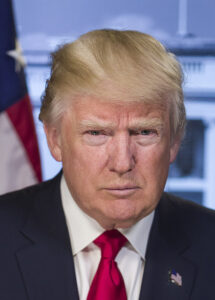 SD METRO: Donald Trump has made many comments about NATO countries increasing their defense spending. He did this during his first term. He’s saying it again. There seems to be this reluctance in Canada, as you mentioned, about meeting the 2% target rate when it comes to NATO spending or defense spending. What is this? It seems there’s this reluctance in Canada about military spending. I don’t know if you can lay this all on Justin Trudeau, maybe you can, but what is going on with this idea?
SD METRO: Donald Trump has made many comments about NATO countries increasing their defense spending. He did this during his first term. He’s saying it again. There seems to be this reluctance in Canada, as you mentioned, about meeting the 2% target rate when it comes to NATO spending or defense spending. What is this? It seems there’s this reluctance in Canada about military spending. I don’t know if you can lay this all on Justin Trudeau, maybe you can, but what is going on with this idea?
Diane Francis: Well, I’ve been writing articles forever about, I get leaks from the military how the equipment is falling apart and rusting, and they can’t recruit people. And my opinion’s always been, you’ve got to pull your weight. We’re in NATO. We have never met our 2%. And a year ago, I think Trudeau went to The Washington Post and said, “Canada’s not going to meet the 2% target ever,” It’s insensitive and it’s obviously wrong in an increasingly dangerous world.
We’re getting away with it now, but we’re not going to get away with it forever because the Americans are going to smarten up. It’s costing them billions to help us. So they smartened up. But up until that point, who cares about a military? We all knew the Americans wouldn’t let anybody invade us. And secondly, we wanted universal daycare and dental care.
And we have it. We have a great healthcare system and you don’t. Because you spend so much on military.
In fact, I even warned in a column a couple of years ago, I said, “Guys, if we don’t do this, if we don’t pull our weight, they’re going to start to send us invoices and they’re going to be big ones.”
Mr. Trump is doing it now, and I don’t blame him.
The military bill that the Americans are paying for the whole world is just not fair, and that’s got to stop. And he’s right on that.
SD METRO: When you think about this merger idea or some sort of political or I guess economic union, how would that play in Canada? Would Canadians be okay with something like that idea? In some ways, we’re the bigger of the two brothers.
Diane Francis: An economic union is not a problem. A full-blown political union is going to get people’s backs up, because we really don’t want your gun laws in your healthcare system. They’re ridiculous. And you can’t barricade yourself against that if you’re a political union.
SD METRO: Sure.
Diane Francis: And, by the way, I said in this book that the merger would happen if we don’t pull our weight militarily, because Americans would be tired of it or there’s a crisis. And I also said that Canadians will be asking for any kind of merger if there’s a crisis. And so, we may see that happen if we end up with a real crisis. I hope not, because that will really affect the U.S. too.
SD METRO: So, under a worst-case scenario, you could see a day, potentially, where the Prime Minister of Canada, whoever the Prime Minister could be, is burning a hotline to the President of the United States, whoever the President of the United States might be, and saying, “We’ve got to figure this out. We’ve got to figure out a way to merge because I don’t have any other choices.”
Diane Francis: Yeah, “Let’s do an economic union.” We’ve got all these phenomenal resources and this is the way. Do a referendum, and away you go.
The economic union is just a plain good idea, but I don’t think a political union, or a big merger is in the cards yet unless there’s a crisis in Canada. And I hope not, but 25% tariffs are going to sink us.
SD METRO: Canada and the United States really are, in many ways, the two largest trading partners for both countries. And the tariffs, if Trump is actually serious, could potentially impact a lot of jobs.
Diane Francis: The other thing that’s quite ironic and funny is that Americans are the biggest investors in Canada, and Canadians are among the biggest foreign investors in the U.S., mostly just real estate. They buy Florida and California and Palm Springs, Arizona. There’s a lot of investment on both sides of the border. The two biggest exports from Canada to the U.S. are the car and car parts industry and oil.
SD METRO: I think we’ve got about 80% of your oil, if I’m correct. I think Canada produces about 5.6 million barrels of oil a day.
Diane Francis: It’s more than Iran and Iraq, and you take it all. But we export just about all of it, and it’s about 50% of your oil.
So, when America brags about being the biggest oil producer in the world, half that stuff is Canadian.
Here’s the point. The oil in the ground is owned by the people of the country in Canada. That’s how our system works. The Crown owns the subsurface mineral rights, but the people that developed it and built the pipelines and so on are mostly American.
And same with the car industry. So if he slaps tariffs on oil and cars as well as everything else, he’s going to be shooting his own American shareholders and owners and pipeline owners in the foot.
SD METRO: There’s also an issue of rare earths, which have been used for a lot of defense products. China had been a big supplier of rare earths. But if I’m understanding this correctly, Canada is also a potential supplier of rare earths, too.
Diane Francis: Huge. Ontario has it. Just about six hours’ drive north of Toronto is one of the biggest areas of rare earths. Alberta not only has oil and natural gas, but it also has lithium, probably more lithium than anywhere in the world. And then, you’ve got Saskatchewan, which has oil, and it has more uranium than any country in the world except Kazakhstan. And it supplies about a quarter of all the uranium to the U.S. So, Canada’s quite a wealthy country.
SD METRO: When you think about the distinguishable differences between the Canadian personality and the American personality, how would you describe them?
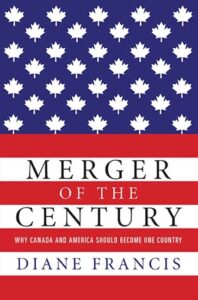 Diane Francis: I looked at it in the first chapter of the book, and I said, “Growing up in the U.S. Midwest, most of the people were Germanic. Same in California, Texas, and in Pennsylvania. It’s not Dutch, it’s Deutsch. The most recent U.S. census, where they ask you your origin, 60% of white Americans said they were German, not part German, not Irish, not Polish, German, 60%.
Diane Francis: I looked at it in the first chapter of the book, and I said, “Growing up in the U.S. Midwest, most of the people were Germanic. Same in California, Texas, and in Pennsylvania. It’s not Dutch, it’s Deutsch. The most recent U.S. census, where they ask you your origin, 60% of white Americans said they were German, not part German, not Irish, not Polish, German, 60%.
Then I looked at all the presidents of the United States. Just about every one of them was Germanic. Trump is half German, or Obama, a quarter German, Nixon was, Eisenhower, of course. What does that mean?
Compared to Canada, the founding people are British or French, and so they have a different sensibility. Manners are very important. Germans are good at metal bashing. They have the best work ethic in the world, and they’re very blunt. Canadians are not blunt, work ethic, eh, not particularly geniuses at technology, science, and engineering. So, it’s certainly a generalization, but I think the social behavior of Americans is more Germanic than the polite British behavior. And so, that can grate people. And I say tough luck. There’s nothing wrong with it. It’s a matter of style.
I think the German influence in the United States has been much bigger than a lot of people realize. And a lot of people changed their names after each war.
And I would say that most of the Silicon Valley guys are of German background.
SD METRO: Americans are much more in your face and louder, too.
Diane Francis: Blunt.
SD METRO: Yeah, blunt and loud. I experienced that when I was a student in France during college. It was easy to spot the Americans a mile away.
Diane Francis: I can go into a restaurant with a bag over my head and I can pick out the Americans at the table because they’re loud – all the time.
SD METRO: There’s also an issue, which I think you discussed in your book. The birth rates of the United States and Canada are low. How does this get resolved too as well? Because if you don’t have enough people to replace you, of course social programs get to be hard to fund because you lack the taxes too as well, because there are less people and all that kind of thing. Is there any way to reverse that in both countries too, at all? Any ideas?
Diane Francis: I don’t think it’s a good idea. I’m not a big fan of birth rates going up. The world is burning up to a cinder because there’s too many human beings, and we use too much of everything. We’re just destroying animal species. We’re fishing out the oceans. We ruin the soil. The whole thing is overpopulation. And so, my understanding is that the global population, and population growth is directly related to the degree of education of the females in your society. The more educated the females, the fewer children they have because they’re smart.
And so, what you basically have to do is just level it off. We’re going to have humanoids and robots to do a lot of this stuff, and AI is going to replace a lot of jobs. So I really think that people aren’t going to be, I’m not saying they’re going to become surplus, but this is a population thing. It sounds very Hitler to me. It sounds very Elon Musk-y. And I don’t get it because it’s not a good idea to me. I’m not a big greenie, but environmentally, we have to know the degradation is there and fires or whatever. And we can’t keep replicating. We just can’t. So the numbers I see, the big, big picture numbers, are that the population of the globe is going to level off in about 2060 and then gradually go down. And I think that’s a good thing.
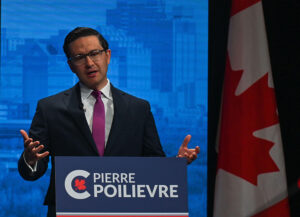
SD METRO: Who are the primary candidates to potentially replace Justin Trudeau? I’ve heard Mark Carney’s name get kicked around. What about the leader of the Conservative Party? Is it Pierre Poilievre?
Diane Francis: I know him personally. He’s a good guy. I know the guys around him. He comes out of the conservative party tradition. He’s smart. He’s very presentable. He gets business and economics. He’s not going to go rogue. So he would be fine. If there was an election tomorrow, he wins by a landslide. As far as the liberals, all the ones that have raised their hands, including Mr. Carney, are, I think, accomplices to the mess they created in 10 years. Carney was their economic advisor, and he did a bad job. And everybody else was in the cabinet of Trudeau. He didn’t have one person with domain expertise holding a portfolio in that government.
SD METRO: Mark Carney not only headed up the Bank of Canada, but at one point he headed up the Bank of England, too. Am I correct?
Diane Francis: Yes. He’s a big deal with Brookfield, which is a gigantic Canadian development and energy company, a big conglomerate. And he’s in charge of their greeny stuff, climate change stuff. And the last thing we need is another person going off half-cocked. Canada’s wealth is based on the extraction of natural resources and oil.
We have never had anything to be ashamed of environmentally. We make them clean up. We’re getting down to net-zero emissions. So to do that is actually economic suicide. And Carney has conflicts of interest too, vis-a-vis Brookfield. They do a lot of business with the federal government. I don’t want him anywhere near it.
SD METRO: If the United States were to have some sort of relationship or a strong relationship with Greenland, and I’ve seen this too as well, where you’ve got Alaska on one side and let’s say some sort of U.S.-Greenland thing on the other side, if you will, east and west. How would Canadians think about that? Would they feel surrounded by the United States? Because we are on the southern border, in Alaska, and in Greenland too? It’s probably a crazy idea, but I get paid to ask crazy, dumb questions, so here I am asking.
Diane Francis: Canadians don’t think of a Canadian world order. They do their thing.
The Americans say, “Well, I’m surrounded here. We have to control everything. And the world order is Western and it’s ours.”
And that’s why your troops are everywhere.
Canadians wouldn’t feel surrounded. They like Americans, and vice-versa. If they could do business and travel together and have a house in Florida or an apartment in California, whatever, that’s what they want.
Canada is a very interesting country. It is, I would say 90% of it is inhospitable. It’s so cold and remote and great parts of it are desert. The Arctic is mostly a desert. There’s no trees up there and no topsoil.
The country is a ribbon of eight cities that are clustered along the U.S. border.
A person in Toronto has more in common with someone in New York than they do with someone in Vancouver. So it’s North-South orientation, and that’s the social networking and the business deals are done North-South so it’s interesting.
SD METRO: And any given time, you’re driving on I-95 in the United States heading down to Florida or going up north, you often see Canadian license plates.
Diane Francis: We have a lousy climate. Canadians are pretty well off. We have a prosperous country.
SD METRO: Thank you, Diane.

